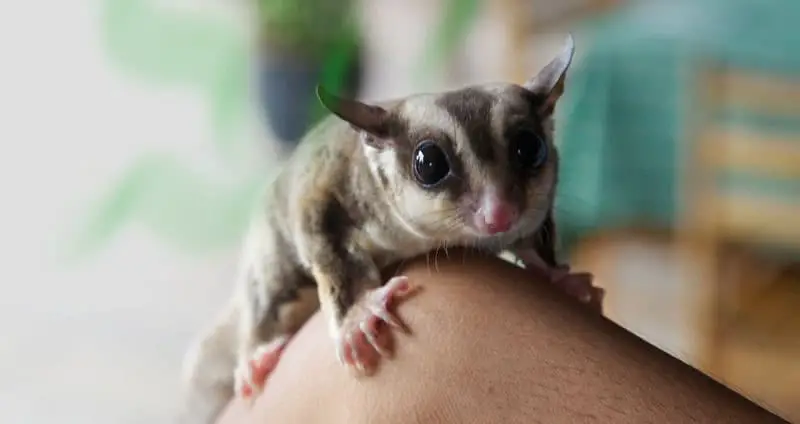There are many questions that arise when you’re bringing a new pet home. What do they eat? How do I train them? Do they bite? All of these are important questions to know the answer to, but there’s a question that’s very prominent in regards to exotic animals: Do they smell?
This post will go in depth about a sugar glider’s various scents and tell you exactly how you can reduce any unpleasant smells that arise.
Table of Contents
Do Sugar Gliders Smell?
Yes, sugar gliders do smell, but not just a singular scent. Instead, sugar gliders have a variety of smells that range from normal and faint to problematic and strong. Knowing what the different smells are will help you to identify whether or not they’re problematic.
Anyone that’s come in contact with sugar gliders will tell you that these creatures do have a smell, but it isn’t as pronounced and off-putting as that of a ferret. The standard smell that sugar gliders have isn’t akin to an unwashed animal — it’s more of a natural must of that creature. To most owners, this natural smell isn’t bad at all.
The natural smell of a sugar glider can change over time, though, due to factors such as age, health, diet, and their environment. A lot of these factors can be influenced to help control their smell, so don’t let that scare you!
Real quick, it should be noted that mostly every sugar glider will have a slight smell to them no matter what they do. They’re living animals, and their natural musk is part of their biology. So, even the most well-care-for sugar gliders will never be entirely scentless.
What Gives A Sugar Glider Their Natural Smell?
A few factors determine the natural scent of a sugar glider, and all of them come down to that sugar glider’s biology and inherent physical traits. Specifically, their smell is caused by scent glands in their skin.
These scent glands are what gives sugar gliders their musky smell. The purpose of these glands is quite simple — they’re used to give off a smell that helps with communications and familiarization in the wild. Sugar gliders can identify each other with these scent glands, and they’re simply a natural characteristic that many creatures have.
Intact male sugar gliders have very prominent scent glands that develop as the sugar glider matures. These glands are visible in two locations on the sugar glider: one on top of the head in the form of a bald spot, and one on the chest right under the neck. This results in males having a stronger natural scent than females.
So, while scent glands help to explain why sugar gliders have a certain musk, they aren’t the reason behind why some sugar gliders and their enclosures smell downright bad.
What Causes Sugar Gliders To Smell Bad?
There’s a significant difference between sugar gliders that smell and sugar gliders that stink. Smelly sugar gliders are simply a result of their biology and years of evolution. Stinky sugar gliders, on the other hand, are a result of a few different factors that can mostly be controlled by their owner.
If you’ve experienced someone talking about how bad sugar gliders smell, there’s a good chance that they’ve experienced unhealthy sugar gliders in a poorly-maintained environment. Dirty sugar gliders and dirty cages are the two main reasons for bad smells.
Dirty Sugar Gliders
Although they’re extremely cute, sugar gliders can get dirty and smelly just like any other living animal. While most sugar gliders shouldn’t be able to get exceptionally dirty if they’re kept inside of your clean home, they can get a bit “dirty” on the inside through a poor diet!
If sugar gliders are fed diets that don’t align with their natural needs, or if they’re oversupplied with vitamins, they’ll produce much more waste than a normal sugar glider. Sugar gliders that eat a poor diet will experience digestive problems that almost always result in smelly poops. This is a massive cause for smelly sugar gliders!
It’s important to know that sugar gliders are quite clean on the outside. They constantly groom themselves and their cage mates, so they’re always on top of their hygiene. You should only wash your sugar glider if they somehow get excessively dirty, in which case a damp washcloth rubbed over their fur would do wonders.
Poor Cage Maintenance
Ironically, a good portion of bad sugar glider smells comes as a result of excessive cage cleaning. If you meticulously and regularly clean a sugar glider’s cage, toys, beds, and accessories, the gliders will quickly undo your efforts by remarking their territory. This involves peeing around their cage to get their scent prominent again.
When a sugar glider is marking their territory, you’ll know. The smell is quite strong and is clearly something that you’ll want to actively avoid.
Additionally, you’ll want to make sure that you’re on top of waste removal. If you don’t clean your sugar glider’s fleece bedding enough, it can definitely result in some very foul smells. This is a simple part of good animal husbandry that most people practice, though, so this tidbit of information is nothing revolutionary.
Keeping Sugar Gliders & Their Cages Smelling Good
In order to keep your sugar gliders smelling as fresh and clean as possible, there are two main things that you need to do as their owner. By taking the time to do the things highlighted below, you’ll drastically reduce the smell of your sugar gliders in addition to keeping their health in tip top shape.
Feeding A Proper Diet
Every living creature has evolved around a specific diet that they’ve been eating. Their bodies have become optimized for digesting and processing certain foods to give them the energy that they need to live. If they eat foods that don’t meet those requirements, some serious problems may arise.
Sugar gliders are no exception to this. These creatures have specific dietary needs that need to be met to ensure proper digestion. The optimal sugar glider diet consists of a healthy pellet food, a nectar-based mixture, multi-vitamins, and fresh fruits and vegetables. If a sugar glider isn’t given a part of this diet, or if they’re given too much of one type (often fruit), digestion will be a challenge.
It’s important to fine-tune your sugar glider’s diet as they grow. If they’re not reacting the best to a particular diet, consider tweaking it and observing the results of that change. Healthy bowel movements will make a sugar glider’s environment smell infinitely better.
Optimal Cleaning Of Cages
Sugar gliders are quite territorial and will quickly mark their territory if they can’t smell themselves in their environment. This process is extremely smelly and should be reduced as much as possible. You want to keep the cage clean, but you don’t want to remove their natural scent.
Therefore, a way to keep a sugar glider’s cage smelling more fresh is by cleaning it less! Or, more specifically, by splitting up the cleaning. One day you can wipe down the cage, another day you can clean bedding, and another day can be the day that you thoroughly clean their toys. This ensures that their scent is always present in their cage — just not very prominently.
Then, of course, you’ll want to spot clean any urine or feces from the bottom of their cage. Staying on top of cleaning like this is a huge aspect of keeping a sugar glider’s environment smelling fresh.

